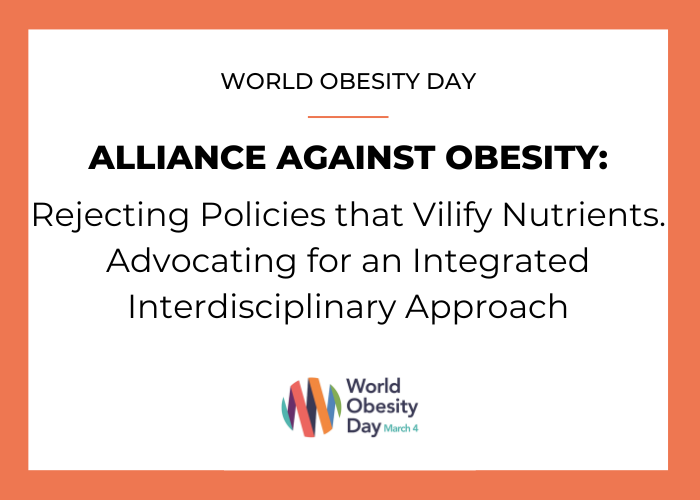Alliance Against ObesityPRESS RELEASE
- 4 March 2024
- Posted by: Competere
- Category: Senza categoria

Leggi il comunicato stampa in italiano
ALLIANCE AGAINST OBESITY: REJECTING POLICIES THAT VILIFY NUTRIENTS. ADVOCATING FOR AN INTEGRATED INTERDISCIPLINARY APPROACH
Prof. Carruba (University of Milan): “Obesity Must Be Integrated into Essential Levels of Care.”
Prof. Paganini (Competere.Eu): “Empowering Consumer Food Awareness. Urgent Rediscovery of the Balance of the Mediterranean Diet.”
***
Milan, March, 4 2024 – “Obesity poses an escalating global challenge, often characterized as an invisible epidemic affecting over a billion individuals worldwide, with 380 million under the age of 15. The severity of this epidemic is such that by 2030, we might witness a reduction in life expectancy due to obesity-related complications—a phenomenon unprecedented in human history. Projections suggest that by 2035, the number of obese individuals could soar to 4 billion, nearly half the projected global population.” This alarming statement was issued today on World Obesity Day by Michele Carruba, Honorary President of the Center for Obesity Study and Research (CSRO) at the University of Milan, and Pietro Paganini, President of the Competere – Policy for Sustainable Development.
Carruba and Paganini are leading figures in the International Alliance Against Obesity, which convened for the first time on January 19 at the University of Milan, inaugurating a series of international symposiums on excess malnutrition.
“Today, obesity isn’t classified as a disease in its own right,” explains Carruba, “but it is closely entwined with numerous non-communicable diseases, themselves among the primary global causes of mortality.”
According to studies conducted by the Alliance, the economic toll of this crisis is estimated at nearly $2 trillion, not factoring in losses associated with diminished productivity and the societal ramifications of stigma.
“In the face of this scenario” – notes Paganini, author of “iFood: How to Escape Food Ideology“, “it’s evident that current public health policies have yet to yield the desired outcomes. I particularly reference the introduction of simplified nutritional labeling, such as Nutriscore, and fiscal policies targeting high-sugar and high-saturated-fat foods. These measures inadvertently curtail freedom of choice and undermine dietary diversity, while also unfairly vilifying specific nutrients without addressing the multifaceted roots of obesity.”
The Alliance asserts that obesity is a multifactorial issue influenced by a myriad of factors, including genetics, metabolism, lifestyle, and psychological well-being. This complexity underscores the absence of a one-size-fits-all solution and underscores the necessity for an integrated approach encompassing balanced nutrition, active living, and robust nutritional education fostering critical thinking and awareness.
According to Paganini urgent action is imperative to “cultivate a health-centric culture valuing equilibrium over imposition, offering a path out of this crisis. Educating individuals about the importance of a balanced lifestyle demands time and dedication, yet it’s essential for equipping future generations to confront the challenges associated with obesity. Our mission is to advocate for policies and initiatives bolstering nutritional education, while simultaneously expanding access to nutritious foods and active living options for all.”
Within this multidisciplinary framework, the Alliance against Obesity emerged, spearheaded by over 30 scientists from diverse disciplines representing universities across Europe. The objective of this nascent scientific community is to compel institutions to recognize obesity as a multifaceted issue, rallying academics, researchers, and thinkers from disparate fields to collectively address the scourge of excess malnutrition.
“Being obese,” adds Carruba, “shouldn’t be construed as a failure to regulate food intake but rather as a malady stemming from the dysregulation of the homeostatic system governing energy metabolism and food consumption. Science confirms obesity as a treatable and preventable condition. Given its intricate interplay of environmental, psychological, and genetic factors, addressing it necessitates an integrated interdisciplinary approach, incorporating psychological support, pharmacological interventions, or, in extreme cases, surgical intervention. However, as of today, we do not have enough medical professionals capable of effectively addressing the obesity problem. Hence, it’s imperative to establish a new medical specialty dedicated to managing this condition. With obesity escalating at an alarming pace, even prompt intervention would necessitate at least a decade to amass an adequate cohort of proficient physicians. Failure to act expeditiously risks rendering the national healthcare system financially untenable. In conclusion, it’s paramount to acknowledge obesity as a disease and integrate it into the Essential Levels of Care (Lea).”
